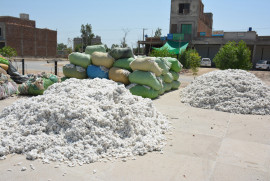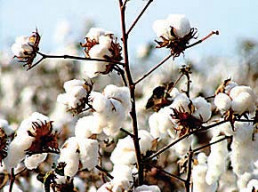
Though the Ministry of National Food Security and Research has sought control over these departments because of being relevant to the ministry, the Cabinet Committee on Restructuring has decided to keep them with the Ministry of Textile Industry.
The controversy over the cotton production data erupted in a meeting of the restructuring committee held on November 11.
During the sitting, the Ministry of Food Security demanded that the Pakistan Central Cotton Committee and the cotton commissioner office should be transferred from the Ministry of Textile Industry, arguing that the two offices had failed to perform in line with expectations and the cotton output had dropped sharply.
The food security and research secretary recalled that his ministry was created on October 26, 2011 and most of the departments and organisations associated with the erstwhile ministry of food and agriculture were transferred to the new ministry.
However, he pointed out, some of the organisations whose activities were closely related to the food security ministry were not handed over to it. Two of them were the Pakistan Central Cotton Committee and the cotton commissioner. Instead, their control was given to the Ministry of Textile Industry.
He argued that the Ministry of Textile Industry, which was mainly associated with the industrial sector, had a natural clash of interest with the agriculturists. In that regard, he cited a persistent decline in the key cotton crop for the past five to six years, causing a huge loss to the national economy.
He insisted that the textile ministry had no linkages with the agricultural community and all issues related to agriculture research on seeds and other inputs were being dealt with by the Ministry of Food Security and Research.
“It is the focal ministry at the federal level which keeps a close liaison with provincial governments on issues of agriculture,” he said.
Speaking to the meeting, the minister of state for professional education and training pointed out that a lot of discomfort was felt by farmers and cotton growers over the placement of agricultural issues with the textile ministry. In order to safeguard the interests of farmers, he stressed, such subjects should be placed under administrative control of the Ministry of Food Security and Research as it was the relevant ministry.
Countering the arguments, the textile ministry secretary claimed that cotton production had, in fact, increased after 2011. “Cotton yield has also risen from 595 kg per hectare in 2002 to 765 kg per hectare in 2014,” he said.
The highest yield of 815 kg per hectare was achieved in 2012.
He said the performance of central cotton committee had improved with particular focus on the collection and use of cotton cess for the improvement in crop and the assistance of farmers.
In an attempt to remove impurities from the cotton produced in Pakistan, the cotton committee and the cotton commissioner had initiated various clean crop programmes for the provincial agricultural departments, growers and cotton-pickers, he said.
He asked the cabinet restructuring body that the cotton committee and the commissioner office should not be transferred to the food security ministry.
Latest data indicates that cotton production was recorded at 8.78 million bales by November 15 this season, up 9.49% from the previous year. Last year, the overall output had dropped about 30%.
Published in The Express Tribune, November 29th, 2016.
Like Business on Facebook, follow @TribuneBiz on Twitter to stay informed and join in the conversation.




















-(1)1714116455-0/Heeramandireactions-(2)-(1)1714116455-0-270x192.webp)












1714024018-0/ModiLara-(1)1714024018-0-270x192.webp)









COMMENTS
Comments are moderated and generally will be posted if they are on-topic and not abusive.
For more information, please see our Comments FAQ